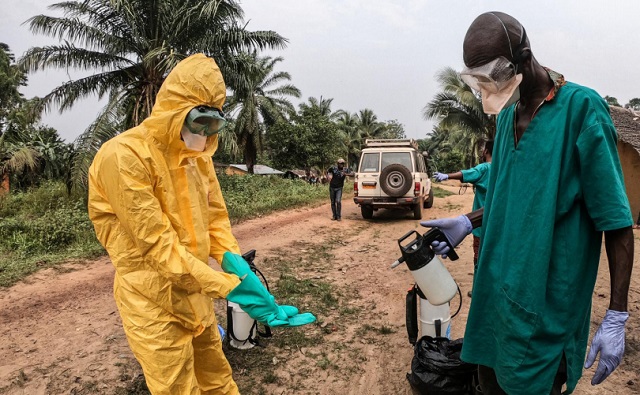
WHO ups risk assessment
| PATRICIA AKANKWATSA | As the Ebola cases in Uganda continue to surge, World Health Organization (WHO) warned on Nov.02 that Ebola’s arrival in the Ugandan capital highlighted the high risk of further spread of the deadly virus, calling on neighbouring countries to boost their preparedness.
Since the outbreak was declared on 20 September, the highly contagious virus has surfaced in 7 rural districts clustered in the centre of the country – Mubende, Kassanda, Kagadi, Bunyangabu, Kyegegwa, Wakiso, Kampala and currently in Masaka.
After hopes that the initial cases might have been contained, Tedros Adhanom Ghebreyesus, the WHO director-general, said he remained concerned about the potential for future spread.
“Although these cases are linked to known clusters, the very fact that there are cases in a densely populated city underscores the very real risk of further transmission and the very urgent need for increased readiness in districts and surrounding countries,” Tedros said
“There may be more chains of transmission and more contacts than we know about in the affected communities. There is a “very urgent need for increased readiness in districts and surrounding countries,” he warned.
Ebola is spread through bodily fluids, with common symptoms being fever, vomiting, bleeding and diarrhoea. It is fought through tracing, containing and quarantining.
WHO incident manager Abdi Mahamud said that outbreaks are difficult to contain, especially in urban environments.
“Ebola in a complex, urban city like Kampala is not easy, and we have to do everything possible to pull every chain of transmission,” he said.
Underlining the alarm over the spread of the haemorrhagic fever, Tedros tweeted last week that tackling Ebola in urban areas is complex, requiring “coordinated & sustained efforts to interrupt transmission”.
He added that WHO continues to work closely with the Government of Uganda and its partners to respond to the outbreak, and urged a strengthened global response and increased donor investment.
To support the response, WHO on Nov 01 released an additional $5.7 million from their Contingency Fund for Emergencies, in addition to the $5 million they had previously released.
The ministry of health spokesperson Emmanuel Ainebyoona said that there’s congestion, there are slums, and there’s high frequency in terms of movement.
“It becomes quite challenging once you’re doing contact tracing,”
The number of contacts listed for follow-up has ballooned to over 2,100 as of 31 October, with reports of logistical failures – including a lack of vehicles – hampering tracing.
Mubende remains the most affected district, however, cases have recently increased in two neighbouring districts, and 17 cases have been confirmed in the capital Kampala and one death in Masaka.
As of Nov. 04, there were 131 confirmed Ebola virus cases, 48 deaths and 54 recoveries.
On Oct. 28, the Ministry of Education and Sports suspended visits in all schools until December 2022 after 6 pupils tested positive from 3 schools in Kampala.
Vaccine
According to WHO, vaccination is usually one of the response interventions in such an outbreak, however, there are currently no licensed vaccines (or therapeutics) for Ebola disease caused by the Sudan ebolavirus (SUDV), though there are several candidate vaccines which appear to be suitable for evaluation in a clinical trial during this outbreak.
Dr Ivan Kimuli case management officer at WHO says that by embedding research at the heart of the outbreak response, can achieve two goals: to evaluate potentially efficacious candidate vaccines and to potentially contribute to ending this outbreak and protecting populations at risk in the future.
The Ministry of Health has designated the Makerere University Lung Institute to conduct vaccine and therapeutics clinical trials. The clinical trial to evaluate candidate vaccines against this ebolavirus is co-sponsored by the Ministry of Health in Uganda and WHO and involves support from partners. A Principal investigator from Makerere University Lung Institute will lead the vaccine trial.
WHO, CEPI and Gavi are providing support to ensure that sufficient doses of candidate vaccines are available for the trial and beyond. If sufficient doses can be made available, the vaccine trial would aim to establish how effective the candidate vaccines are in diverse populations.
The vaccine developers and funders who will make the candidate vaccines available include the University of Oxford and the Serum Institute of India, the Sabin Vaccine Institute and the US government institutions Biomedical Advanced Research and Development Authority (BARDA) and National Institutes of Health (NIH), as well as International AIDS Vaccine Initiative (IAVI) and MSD.
Moreover, there are other organisations committed to supporting the overall response, including Africa Centres for Disease Control and Prevention (Africa CDC), UNICEF, non-governmental organizations, donors, and regulators including the African Vaccine Regulatory Forum (AVAREF).
****
 The Independent Uganda: You get the Truth we Pay the Price
The Independent Uganda: You get the Truth we Pay the Price





